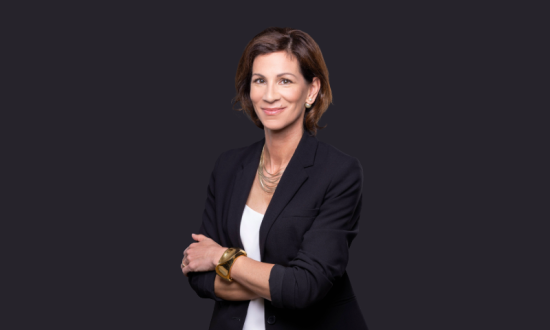Dr. Bianca Lins, LL.M. is a Legal & Compliance Officer at the Liechtenstein Office for Communications (OfCom), the regulatory authority for the electronic communication and space sector. She is the POC for space activities and responsible for the implementation of legal requirements. In doing so, she co-drafted the Liechtenstein Space Act and the Liechtenstein Cybersecurity Act. Before working for OfCom, she was a researcher at the University of Liechtenstein, where still teaches Cybersecurity & Law. In 2023, she was awarded the “Cybersecurity Woman of the Year Award” (category Law Professional). In her early career she worked in IT and financial markets.
Recently, in an exclusive interview with Digital First Magazine, Bianca shared her professional trajectory, insights on the infusion of technology into the legal system, the biggest challenges that might affect the legal sector in the next 5 years, significant career milestones, future plans, pearls of wisdom, and much more. The following excerpts are taken from the interview.
Bianca, please tell us about your background and areas of interest.
My background is a blend of legal expertise, a deep-seated passion for cybersecurity and space, and a commitment to education and mentorship. Before embarking on my academic journey in law, I had already established a career in the IT and finance sectors. This experience provided me with a solid foundation and a unique perspective that I later brought into my legal studies and research. In 2011, while raising two young children, I decided to further my education and completed my high school diploma, marking the beginning of my formal journey in the legal field.
I pursued law studies at the University of Linz in Austria, where my interest in the intersection of law and technology began to take shape. My passion for this field was further solidified through my Executive Master of Laws, where my thesis on Robo Advice was recognized with a best paper award. Completing my doctorate “summa cum laude” was a milestone that signified not just academic achievement, but also represented the culmination of balancing family life with a deep commitment to learning and exploring new frontiers in law and technology.
In my current role as the Legal & Compliance Officer at the Liechtenstein Office for Communications, my responsibilities include regulatory oversight in electronic communications and the space sector. Part of my role involves active engagement in various committees and working groups, such as BEREC Cybersecurity, Eutelsat, and the ITSO Advisory Committee. Additionally, contributing to the drafting of significant legislation like the Space Act and the Cybersecurity Act is among my key responsibilities, showcasing my commitment to shaping the legal landscape in these vital areas.
Aside from my role at the Office for Communications, I maintain a strong connection with academia. I continue to teach at the university, focusing on Cybersecurity & Law, and am currently engaged in writing various articles and a book project on cybersecurity. My role as a mentor is also central to my professional life, as I am passionate about guiding and inspiring the next generation of professionals in this field.
I was deeply honored and humbled to receive the ‘Cybersecurity Woman of the Year’ award in 2023. This recognition, which reflects the collective effort and support of many, serves as a reminder of the meaningful progress we are making together in the field of cybersecurity. I believe that my non-traditional path and the challenges I have overcome serve as a testament to the importance of persistence, continuous learning, and the drive to make a positive impact in the world.
How do you see technology helping the legal system, which is otherwise known to be very traditional and conservative?
In my view, the infusion of technology into the legal system, particularly in the public sector where I’m currently engaged, heralds a transformative era. Traditional and conservative though the legal framework may be, technology offers unprecedented opportunities to enhance its efficiency, accessibility, and adaptability. Technology is not just an adjunct to the legal system; it’s a catalyst for its evolution, making it more efficient, equitable, and equipped to handle the challenges of the modern world.
For example, we’re seeing the introduction of digital courtrooms and e-filing systems which expedite case handling and reduce paper-based inefficiencies. Moreover, advanced data analytics and AI tools are becoming indispensable in legal research, helping to sift through vast amounts of legal precedents and literature, thereby aiding in more informed decision-making.
Another critical area is cybersecurity law, where technology plays a dual role. It not only presents new challenges and complexities that the legal system must address, but also provides innovative tools for legal professionals to combat cyber threats effectively. This is especially vital in the public sector, where protecting sensitive data and infrastructure is paramount.
Furthermore, technology facilitates greater access to legal resources for the public. Online legal services and platforms are democratizing legal advice, making it more accessible and affordable. This is crucial in bridging the gap between the public and the legal system, ensuring that legal assistance isn’t a privilege confined to a few.
In the space sector, where legal frameworks are still evolving, technology provides a unique opportunity to shape laws that are forward-thinking and adaptable to future innovations. As we venture further into space exploration and utilization, the legal system must keep pace, and technology is the key to that agility.

The legal profession is changing, and professionals need to be more business and tech savvy. What do you see as the biggest challenge for the legal professional in let’s say five years from now?
I see the biggest challenge for legal professionals in the next five years as twofold: mastering the technological tools that are revolutionizing our field, and doing so in a way that upholds the ethical standards that are the bedrock of our profession. It’s about striking a balance between being tech-savvy and ethically vigilant, ensuring that as we embrace innovation, we don’t lose sight of the fundamental principles that define our role in society.
The rapid advancement of technologies like AI and machine learning is transforming and reshaping the very fabric of our daily lives and the way we work. These technologies are forging new frontiers, bringing about a wave of novel legal and ethical questions. Take, for example, the realm of autonomous driving. This innovation is set to revolutionize transportation, offering potential benefits such as increased efficiency and reduced accident rates. However, it also presents complex legal challenges that ripple across various aspects of law and ethics.
Autonomous vehicles raise questions about liability in the event of accidents. Who is responsible when a driverless car is involved in a collision – the manufacturer, the software developer, or the owner of the vehicle? Moreover, the data security and privacy issues associated with autonomous vehicles are significant. These cars rely on vast amounts of data to operate, including sensitive personal information about their occupants. The collection, storage, and use of this data bring forth concerns regarding privacy rights and data protection, areas that are already a hotbed of legal activity. Ethically, autonomous driving technology forces us to confront dilemmas that were once purely theoretical. For instance, how should an autonomous vehicle’s software be programmed to respond in a scenario where an accident is unavoidable? The decisions made by programmers today could have profound ethical implications in real-world situations tomorrow.
In essence, the challenge for legal professionals over the next five years is to navigate this new landscape where technology is continuously reshaping societal norms and working methodologies. We need to develop legal frameworks that are flexible enough to adapt to these rapid changes while ensuring that they align with ethical principles and societal values. Our role is not just to respond to these developments but to actively shape the discourse around them, ensuring that the law remains a guiding force in a world increasingly driven by technology.
How can lawyers use emerging technologies in their day-to-day operations?
Incorporating emerging technologies into daily legal practice offers numerous advantages for lawyers, particularly in terms of efficiency and client service. The rise of cloud computing has revolutionized data management in the legal field. It allows lawyers to access case files and collaborate from virtually anywhere, streamlining workflows and client interactions. The integration of chatbots and virtual assistants into legal practice can enhance client service. These tools handle routine inquiries and tasks, enabling lawyers to concentrate on more complex legal issues.
Blockchain technology is significantly impacting areas like contract law and intellectual property. Smart contracts automate and secure the execution of agreements, while blockchain’s robust record-keeping capabilities are invaluable for ensuring the integrity of legal documents.
AI and machine learning, for example, are transforming legal research, allowing for the rapid analysis of large volumes of legal documents and precedents. This not only saves time but also enhances the accuracy and depth of legal research.
Furthermore, emerging technologies like virtual and augmented reality are beginning to be used in litigation to recreate scenes for a more immersive evidence presentation. This could revolutionize the way evidence is understood and interpreted in courtrooms.
The integration of emerging technologies into legal practice offers a plethora of benefits. It not only enhances the efficiency and effectiveness of legal services but also opens up new avenues for innovation in the way lawyers operate and engage with their clients. But the key is to embrace these technologies thoughtfully, ensuring they complement and enhance the legal expertise rather than replace the crucial human element of legal practice.

According to you, how are legal technology providers addressing the need for data security?
In the field of legal technology, the issue of data security is at the forefront of everyone’s mind. Speaking from my experience and observation, providers are really stepping up to meet this challenge, but there’s a range of how well they’re doing it. Many are turning to established security standards like NIST and ISO 27001 as their guiding frameworks. These aren’t just checkboxes; they’re comprehensive guides that cover everything from risk management to incident response. By aligning with these standards, providers are able to offer a level of security that’s robust and reliable.
Then there’s the legal side of things, like the NIS-2 Directive in the EU, which is quite stringent. It’s not just about being compliant for compliance’s sake; it’s about genuinely protecting data. Providers who are serious about their role understand this and are integrating these requirements into their operations.
However, it’s not uniform across the board. While many providers are doing an excellent job, staying ahead of threats and regularly updating their security measures, others might not be as proactive. This is where the challenge lies. In this digital age, staying static isn’t an option; the goalposts for data security are always moving.
From my viewpoint, the key for legal tech providers is not just to meet the current standards but to continuously evolve and adapt. It’s about being vigilant, educating ourselves and our clients, and always striving for better security. After all, in legal tech, the way we handle data security is as important as the services we provide.
Do you think that Law Schools understand the need to change the traditional curriculum or at least give more attention to the business of law?
I believe there’s a growing awareness of this necessity. The legal profession is not static; it’s continually evolving with the advancement of technology and the changing landscape of global business. Consequently, legal education must adapt to prepare future lawyers for these challenges.
Many law schools are already taking steps to integrate courses that cover the business aspects of law, technology’s impact on legal practice, and the emerging trends in the legal industry. This shift is partly due to the realization that legal practice today demands a broader skill set than before, one that encompasses business acumen, technological proficiency, and an understanding of global market dynamics.
Additionally, the legal profession’s increasing overlap with fields like finance, technology, and international business necessitates a more interdisciplinary approach to legal education. Law schools that are proactive in updating their curricula are not just responding to current trends but are also positioning their graduates for success in a legal landscape that’s becoming more integrated with business and technology.
However, the pace of change varies among institutions. While some are at the forefront of this evolution, others may still be anchored in traditional methods. The challenge for law schools is balancing the foundational aspects of legal education, like critical thinking and legal theory, with practical skills and knowledge about the business of law. The most forward-thinking law schools are those that not only acknowledge this need but actively embrace it, ensuring their graduates are well-equipped for the modern legal environment.
What three qualities do you think a modern lawyer should have?
I believe there are three key qualities that define a modern lawyer, qualities that resonate deeply with the challenges and opportunities we face today.
Firstly, being technologically adept is no longer a luxury but a necessity. It’s not about being a tech wizard, but about having a comfortable grasp on how technology influences legal practices. This includes everything from understanding e-discovery tools to grappling with the implications of data privacy laws. It’s about embracing the digital age in law, and not just as a bystander.
Then, there’s the undeniable importance of adaptability and a commitment to lifelong learning. The legal world is not static; it’s a vibrant, ever-changing entity shaped by new laws, societal shifts, and global events. A modern lawyer needs to be nimble, ready to learn and relearn, and open to evolving their practice. This might mean staying updated on legal precedents today and understanding new international regulations tomorrow.
Lastly, and perhaps most importantly, is the combination of emotional intelligence and cultural competence. Law isn’t just about statutes and case law; it’s about people. Whether it’s interacting with clients from diverse backgrounds or working within increasingly global teams, understanding and valuing different perspectives is crucial. It’s about more than just legal expertise; it’s about empathy, ethics, and the ability to see the world through others’ eyes.
With other words, the modern lawyer needs to be a hybrid of sorts – grounded in traditional legal excellence but also adept in the digital world, adaptable, and culturally and emotionally intelligent. This blend is what will make lawyers not just competent professionals but invaluable assets in this rapidly evolving world.

What do you feel has been your ‘career-defining’ moment?
Thank you for asking that question. It’s a challenging one because, throughout my career, I’ve had many defining moments, each shaped by different experiences and the wonderful mentors and colleagues I’ve had the privilege of working with. However, if I had to pinpoint one ‘career-defining’ moment, it would be organizing the first ‘Cybersecurity & Law Conference’ at the University of Liechtenstein in 2018.
This event stands out to me for several reasons. Firstly, it was my very first conference that I organized and a true amalgamation of my passions in both the legal and cybersecurity fields. Secondly, the conference provided a unique platform to collaborate and learn from others. As the first event of its kind at the University, it was a humbling experience to bring together diverse experts from various domains. The real challenge and reward lay in orchestrating a space where different perspectives could intersect and contribute to the dialogue in cybersecurity and law. Seeing these interactions and the exchange of knowledge was a subtle yet profound reminder of how much we can achieve when we work together. Moreover, the conference led to the development of the Certificate program ‘Digital Legal Officer,’ which I had the honor of founding and continue to teach.
Reflecting on this journey, I’m grateful for the numerous mentors, colleagues, and students I’ve met along the way. Their insights and support, as well as the support of my family, have been invaluable in shaping my career path. Organizing this conference was indeed a milestone in my career, but what truly defines my professional journey is the continuous learning, growth, and the meaningful connections I’ve made with people along the way.
How do you like to spend your time when you are not working?
When I’m not working, I cherish the time I spend with my family. We often travel together, exploring new places and enjoying nature, which is a great way for us to connect and unwind. Additionally, I have a passion for music and I’m the lead singer of a local band – The Scoops. I love to sing, being part of the band is a fantastic experience and I share some great moments with my band mates.
Besides these personal interests, I’m deeply committed to my local community. I serve as the Chair of a local association, where we undertake various projects aimed at strengthening our community, especially focusing on the younger generation. Through this role, I have the opportunity to engage with and contribute to the community, which is both fulfilling and a way to give back.
Where do you see yourself in the next five years?
I see the next five years as a period of meaningful growth, impactful work, and maintaining the passions that keep me grounded and fulfilled. Professionally, I aim to deepen my expertise in cybersecurity and space law, potentially taking on more significant projects or leadership roles that allow me to contribute more substantially to these fields.
On the community front, I hope to expand the impact of our local community association, reaching more young people and fostering greater community engagement. I believe in the power of local initiatives to make a real difference, and I’m excited about the potential to grow these efforts.
Personally, continuing to spend quality time with my family, traveling, enjoying nature and my band are priorities for me.
One piece of advice you would like to share with aspiring lawyers.
The legal field is constantly evolving, with new challenges and opportunities emerging all the time, especially in areas like technology and international law. Embrace continuous learning and adaptability. Staying curious and open-minded, always eager to expand your knowledge and skills, is vital.
Furthermore, the value of empathy and understanding in our profession cannot be overstated. Law isn’t just about statutes and legal principles; it’s inherently about people and their lives. Being able to see things from multiple perspectives and understanding the human element behind legal issues is key to becoming not just a competent lawyer, but a compassionate one.
Also, never underestimate the power of perseverance and resilience. The journey through a legal career can be demanding, with inevitable setbacks. Remember why you chose this path and let that passion drive you forward. The most fulfilling achievements often come from overcoming the toughest challenges.
Stay curious, be empathetic, and remain resilient – these qualities are essential not just for a successful legal career but also for a rich and rewarding professional journey.






